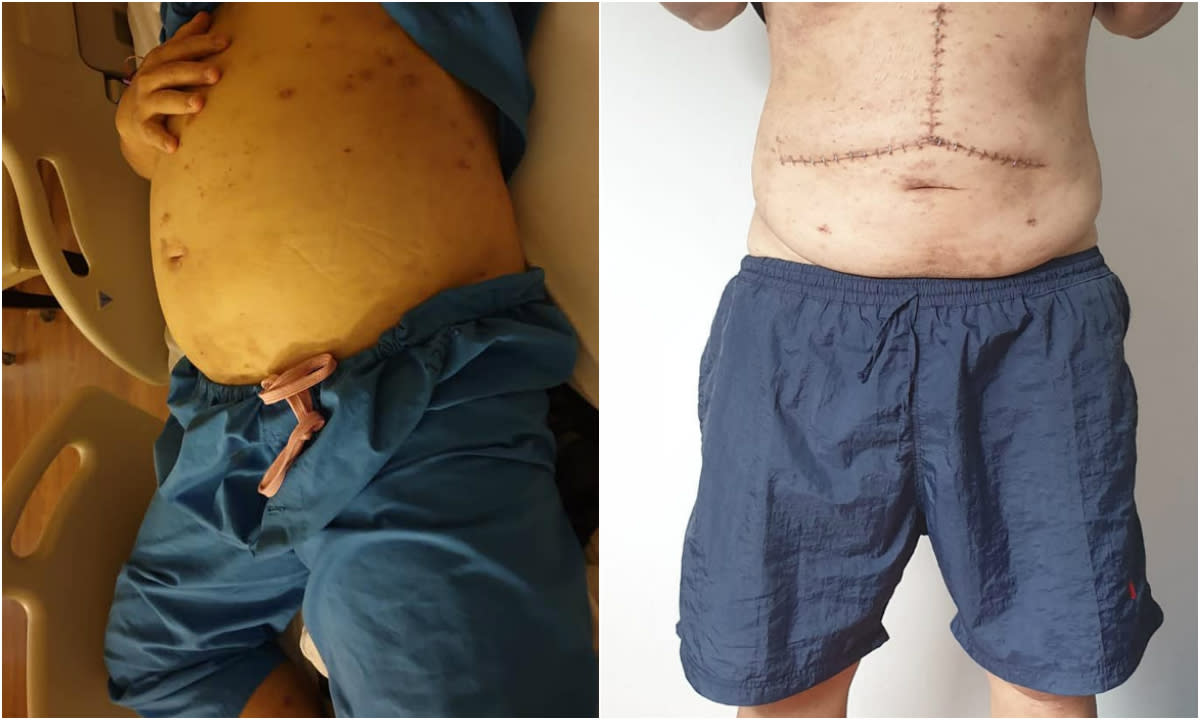Gift of life: Singaporean gets new liver thanks to son's appeal and selfless stranger

SINGAPORE — Eddie Tan was facing a critical health situation as his liver was failing, but a successful public appeal started by his son has given him a new lease of life.
The 59-year-old former project manager received the lifeline from a complete stranger just eight days after his 24-year-old son Leslie posted the appeal on Facebook calling for liver donors to help his father.
On 30 May, Tan received the liver transplant following a gruelling eight-hour operation at the National University Hospital (NUH)’s National University Centre for Organ Transplantation (NUCOT).
His saviour was fellow Singaporean Lin Hanwei, 36, a financial services director with AXA Insurance, who separately underwent an operation for five and a half hours.
The spirit of selfless giving runs in the Lin family. Seven years earlier, Lin’s younger brother, now 34, had also donated his kidney to a complete stranger at the same hospital.
When approached for an interview, Lin declined to speak to Yahoo News Singapore as he is currently recuperating from the operation.
Leslie said he was surprised and humbled not just by Lin’s gift of life, but also by the number of strangers who offered to donate their livers.
Over 50 people volunteered to be donors after reading about his father’s plight detailed in a Facebook post uploaded on 22 May, said the Nanyang Technological University final-year student.

Scepticism about social media appeal
Leslie admitted that he had initial misgivings about posting the appeal on social media. “I was unsure about finding any donors through this way,” he said.
He also thought to himself, “How likely was it that someone would go this far for a complete stranger?”
He posted the public appeal as a last resort as Tan’s liver had deteriorated drastically due to a worsening chronic hepatitis B infection. A donor had to be found within a week from the posting to ensure Tan’s best chance of survival.
The dire situation was indicated by Leslie’s updates to his post. On his father’s condition, he wrote, “10 litres of water was trapped within the body cavity. He cannot eat, cannot drink, cannot sleep, and he is in perpetual distress and pain.”
Associate professor Alfred Kow, a liver transplantation senior consultant at the NUCOT who was part of a team that operated on the donor, said the chance of finding a suitable donor is about one in three.
“This estimate is very much dependent on the blood group match, body weight match, size of the liver, quality of the liver – for example, whether the potential donor has fatty liver – and anatomical structures of the liver,” he added.
All prospective donors have to go through a series of blood tests and scans to ensure that they are physically healthy and will not be harmed through the act of donation. They have to attend a mandatory counselling session and be evaluated by an independent transplant ethics committee, which will decide if a transplant can take place.
Before the successful appeal, the Tans knew they were racing against time as both immediate and extended family members, including Leslie and his elder sister, shared different blood types from their father: A+ or AB+ to Tan’s O+.
“We looked up the Internet and saw that there was a new incompatible blood type transplant pioneered by the Singapore General Hospital,” said Leslie. “However, given the delicate state my father was in, we were told that this technique would be difficult and risky to execute.”

Overwhelmed by public response
“Helpless, lost, but also determined to do everything within their power”, Leslie and his family began messaging all of their contacts. He turned to Facebook when friends suggested tapping the power of social media to spread the word.
Despite distractions such as offers to buy “deer stem cell capsules with special rejuvenating properties” or comments by netizens who claimed his story was “fake news”, his efforts to publicise the appeal on social media paid off.
As word got around, online and traditional media outlets picked up his story. His family began getting responses from people “who bravely volunteered to be donors”.
“This noble and generous spirit has been a pillar of support that has helped our family through this difficult period,” said Leslie.
Road to recovery
His father is now slowly recovering and getting adjusted to his new medication regime. Tan, who was 85kg when he was first admitted to hospital on 7 May, had lost 15kg during his 30-odd day stay there.
He is currently on immunosuppressants – medications that curb the immune system – to avoid rejection of the newly transplanted liver, and can only consume food that is thoroughly cooked with no bacteria, said Leslie.
For now, edibles such as half-boiled eggs are “off the menu”, and his father will have to go for weekly checkups at the NUCOT. “If the outlook is good, then the check-up frequency would decrease to monthly or even half-yearly,” he added.
In living donor transplants, between 40 and 60 per cent of the donor's liver is removed. The liver would regenerate itself almost immediately.
The livers of both donor and recipient would regenerate almost completely within six to eight weeks and continue to grow throughout the first year after surgery.
The experience has inspired Leslie to share his story and give others facing similar situations the hope to live on.
“I hope that through our experience, we can help more people understand the process of organ donation and appreciate the difference such a generous act can make to people's lives,” he said.
Related story:
More Singaporeans willing to be living organ donors: NUH surgeon


